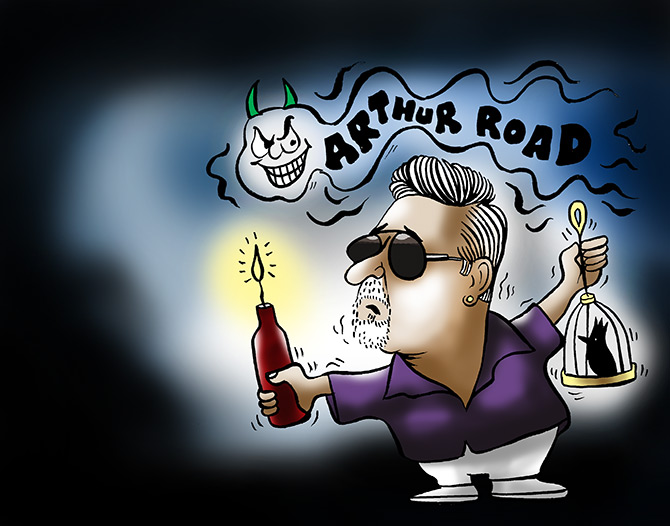 | « Back to article | Print this article |
An extradition expert in the UK said the strict social distancing norms in place to try and curb the spread of COVID-19 may add a further dimension to the UK's Article 3 obligations under the European Convention on Human Rights, relating to inhuman and degrading treatment or punishment.

The coronavirus pandemic may impact the timescale for the extradition to India of liquor tycoon Vijay Mallya, who lost his UK high court appeal on Monday against the Indian government's fraud and money laundering case.
The Royal Courts of Justice in London concluded that the 64-year-old former Kingfisher Airlines boss did have a prima facie case to answer in the Indian courts over the alleged Rs 9,000-crore fraud associated with loans sought from Indian banks for his now-defunct airline.
However, an extradition expert in the UK said the strict social distancing norms in place to try and curb the spread of COVID-19 may add a further dimension to the UK's Article 3 obligations under the European Convention on Human Rights, relating to inhuman and degrading treatment or punishment.
“In terms of the timeframe, much now is up in the air due to coronavirus. There is a question now that the UK could be in breach of Article 3 if it were to extradite a person to a country where they could be at risk of being detained in an environment where they are at risk of contracting coronavirus,” said barrister Toby Cadman, co-founder of Guernica 37 International Justice Chambers and an extradition specialist.
Lord Justice Stephen Irwin and Justice Elisabeth Laing, in a judgment handed down remotely this week under the Covid-19 protocol in place across the UK judicial system, ruled “here is a prima facie case both of misrepresentation and of conspiracy, and thus there is also a prima facie case of money laundering”.
Mallya has 14 days to seek permission to appeal in the Supreme Court against the high court order dismissing his appeal and the UK Home Office can carry on with the extradition process only once that avenue has been exhausted.
The leave to appeal to the Supreme Court is on a point of law of general public importance.
Cadman, who has led several high-profile extradition cases in the UK, explained: “That is a very high threshold that is not often met. Further, much of the deliberation of the Chief Magistrate and now the High Court was on the facts.
"The high court effectively ruled that even if the approach of the Chief Magistrate was wrong, her decision was not wrong.
“It is therefore clear that Mallya now faces a significant hurdle in getting it to the Supreme Court.”
As a further step, in principle, Mallya can also apply to the European Court of Human Rights (ECHR) to prevent his extradition on the basis that he will not receive a fair trial and that he will be detained in conditions that breach Article 3 of the European Convention on Human Rights, to which the UK is a signatory.
This was a route used by wanted bookie Sanjeev Chawla just days before his extradition but he failed to secure the interim order and was finally extradited to India in February to face charges of match-fixing, involving former South African cricket captain Hansie Cronje in 2000.
The threshold for an ECHR appeal is therefore also extremely high, with very limited chance of success in Mallya's case because he would also have to demonstrate that his arguments on those grounds before the UK courts have been previously rejected.
In her verdict at the end of a year-long extradition trial in December 2018, Chief Magistrate Emma Arbuthnot at Westminster Magistrates' Court in London found “clear evidence of dispersal and misapplication of the loan funds” and accepted a prima facie case of fraud and a conspiracy to launder money against Mallya, which has now also been accepted by the high court.
The Chief Magistrate had also dismissed any bars to extradition on the grounds of the prison conditions under which the businessman would be held at Barrack 12 of Arthur Road Jail in Mumbai.
Her decision to accept the Indian government's assurances that Mallya would receive all necessary medical care behind bars had also been accepted by the UK high court, as it had refused permission to appeal on human rights grounds last year.
Mallya, meanwhile, remains on bail in the UK on an extradition warrant executed by Scotland Yard three years ago.